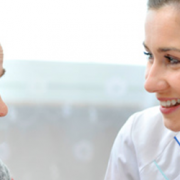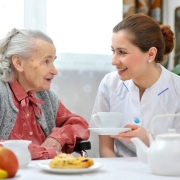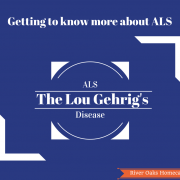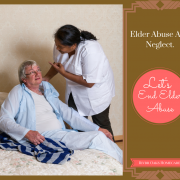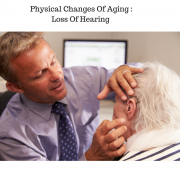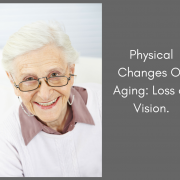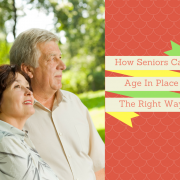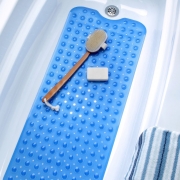Winter Safety: Top 5 Tips for Caregivers and their Seniors
Winter weather can bring special challenges and circumstances to seniors and their caregivers. By taking a little extra precaution, you can be prepared for whatever the winter weather may bring your way.
Top 5 Winter Weather Risks:
- Home power outages
- Colder weather
- Carbon monoxide poisoning
- Outdoor dangers
- Nutrition and staying healthy
-
Home Preparation for Power Outages:
Sudden power outages can be scary and frustrating, especially if they last for more than a few minutes. Prepare your home in case there is a power outage, so you’ll be ready when it goes dark. Put together an emergency preparedness kit in case of a prolonged or widespread power outage.
Emergency Preparedness Kit:
- Water – One gallon per person, per day (2-week supply).
- Non-perishable food (2-week supply).
- Flashlight
- Battery-powered or hand-crank radio (NOAA weather Radio, if possible)
- Extra batteries
- First Aid Kit
- Medications (7-day supply) and required medical items.
- Multi-purpose tool
- Sanitation and personal hygiene items.
- Copies of personal documents (medication list and medical information, deed/lease to home, birth certificates, Insurance policies)
- Cell phone with chargers
- Family and Emergency Contact information.
- Extra Cash
- If someone is dependent on electric-powered, life-sustaining equipment, include backup power in your plan.
- Keep a non-cordless phone in your home. It will likely work even if the power is out.
- Car with a full tank of gas
Reference: www.redcross.org
-
Dressing for Cold Weather:
Cold temperatures can lead to frostbite and hypothermia – a condition where the body temperature dips too low. More than half of hypothermia-related deaths were of people over the age of 65, according to the CDC (www.cdc.gov)
- Bundle up – Keep indoor temperatures warm and dress in layers. If going outside in very cold temperatures, cover all exposed skin. Use a scarf to cover your mouth and protect your lungs. When venturing outside, make sure you are outfitted with:
- Warm socks.
- A hat.
- Gloves.
- A scarf.
- A heavy coat.
- Prevent Falls in Slippery conditions – Icy, snowy roads and sidewalks make it easy to slip and fall. Falls are a leading cause of death from injury in men and women over the age of 65 (www.cdc.org). Help prevent falls in winter weather:
- Stay indoors until roads are clear and conditions have dried.
- Wear shoes with good traction and non-skid soles.
- Replace a worn cane tip.
- Take shoes off immediately after coming indoors.
-
Prevent Carbon monoxide poisoning:
Carbon monoxide is gas that cannot be seen or smelled, making it nearly impossible to detect unless you have an alarm. Using the fireplace, gas heaters or lanterns can lead to carbon monoxide poisoning. Keep seniors safe by making sure they have a current carbon monoxide detector and check batteries regularly.
Avoid leaks and poisoning by having any active fireplace or natural gas heater inspected to ensure it is properly vented.
-
Outdoor Safety:
Driving and walking in harsh winter conditions can pose health hazards. Stay indoors during severe winter weather and follow these tips if and when you must go outside:
- Dress warm and wear the proper footwear to help prevent slips and falls.
- Make sure the path to your door, garage and mailbox are shoveled and free of debris.
- Use salt to melt icy sidewalks and steps or cover the ice with something gritty such as sand or cat litter.
- Take your time to reduce your risk of falling
-
Good Nutrition:
Proper nutrition in the winter months can boost immunity and help provide seniors with much-needed nutrients to ward off the germs that cause colds and the flu and even help minimize a cold’s duration.
Nutrition tips for your best Immunity:
- Increase your intake of fruits and vegetables rich in nutrients such as citrus, cabbage, broccoli, pumpkin, sweet potato and spinach.
- Fight infections with Zinc. Zinc is found in fish, oysters, poultry, eggs, milk, unprocessed grains, and cereals.
- Drink hot tea to help ward off germs.
- Include good bacteria in your diet. Products such as kefir, yogurt and sauerkraut provide live cultures that help fight off infections.
- Take a daily multivitamin.
BONUS: Car and Driving Precautions
- Keep an ice scraper in your car.
- Check your wipers and wiper fluid. keep an extra gallon of cold-weather formula wiper fluid in the car or garage.
- Be mindful of travel warnings or advisories during winter weather.
- Tell someone where you are going and when you expect to be back.
- Take a cell phone with you.
You can download this article here: Winter safety tips for Seniors and Caregivers
In need of Homecare? Call River Oaks Homecare TODAY. 267-755-7500. We can help with the following services and much more: Our Services
Content Credit: Clear Care
#weloveseniors

